As is usual for Google these days, the newest Pixels were spoiled well before the Made By Google announcement event. But that hasn’t dampened our enthusiasm one bit, as the Google Pixel 8 and Pixel 8 Pro are easily the two most advanced and desirable phones Google has ever created. The new Pixel 8 range introduces the Google Tensor G3 processor, a variable 120Hz refresh rate for both phones, and the option for 1TB of storage on the Pro model.
These two Pixels are the top smartphones you can buy from Google, but it’s clear just from the names that there’s a gulf between the two. That the “Pro” model is the more advanced and expensive of the two isn’t going to surprise anyone, but there’s a question here: Is it worth spending more on the Pixel 8 Pro, or does the Pixel 8 offer everything you need in a much cheaper package?
We put the two of them head-to-head to find out.
Google Pixel 8 Pro vs. Pixel 8: specs
| Google Pixel 8 Pro |
Google Pixel 8 | |
| Size | 162.6 x 76.5 x 8.8mm (6.4 x 3 x 0.3 inches) | 150.5 x 70.8 x 8.9mm (5.9 x 2.8 x 0.4 inches) |
| Weight | 213 grams (7.5 ounces) | 187 grams (6.6 ounces) |
| Screen size | 6.7-inch Super Actua OLED display with 1-120Hz refresh rate | 6.2-inch Actua OLED with 60-120Hz refresh rate |
| Screen resolution | 2992 x 1344 pixels (489 pixels per inch) | 2400 x 1080 pixels (428 ppi) |
| Operating system | Android 14 | Android 14 |
| Storage | 128GB, 256GB, 512GB, 1TB | 128GB, 256GB |
| MicroSD card slot | No | No |
| Processor | Google Tensor G3 | Google Tensor G3 |
| RAM | 12GB | 8GB |
| Camera | Triple lens 50-megapixel wide, 48MP ultrawide, and 48MP telephoto rear, 10.5MP front | Dual lens 50MP wide, 12MP ultrawide rear. 10.5MP front |
| Video | 4K at up to 60 frames per second, 1080p at 60 fps | 4K at up to 60 fps, 1080p at 60 fps |
| Bluetooth version | Bluetooth 5.3 | Bluetooth 5.3 |
| Ports | USB-C | USB-C |
| Fingerprint sensor | Yes, in-display | Yes, in-display |
| Water resistance | IP68 | IP68 |
| Battery | 5,050mAh
30W wired charging 23W wireless charging Reverse wireless charging |
4,575mAh
27W wired charging 18W wireless charging Reverse wireless charging |
| App marketplace | Google Play Store | Google Play Store |
| Network support | Most major carriers | Most major carriers |
| Colors | Bay, Porcelain, Obsidian | Hazel, Rose, Obsidian |
| Price | Starting at $999 | Starting at $699 |
| Buy from |
Google Pixel 8 Pro vs. Pixel 8: design, display, and durability
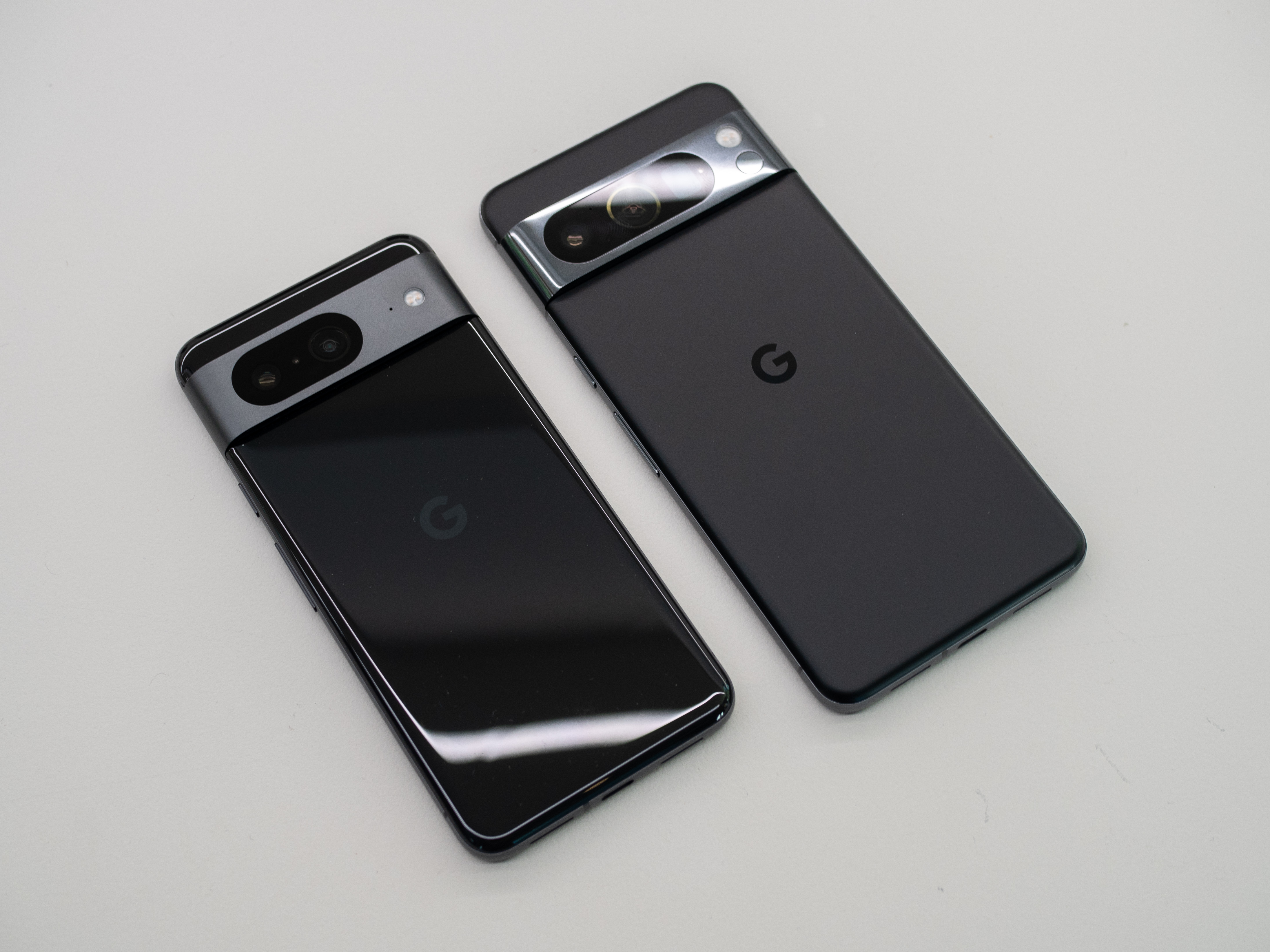
Google isn’t changing the design up much with the Pixel 8 range, and whether that’s a good thing or not will depend largely on how you feel about the Google Pixel 7‘s design. The dimensions are slightly different, but aside from that, you’re looking at the same rounded corners, glass-over-metal build, and camera visor. It’s a unique look and certainly not boring, which is something Google has struggled with in past Pixel phones. The two smartphones in question are largely the same, albeit with the Pro being distinctly larger than the standard Pixel 8. The Pixel 8 Pro is also quite weighty, tipping the scales at over 200 grams. But really, that’s expected with a phone this large.
There are more differences when we look at the displays. Both sport variable 120Hz refresh rates, meaning the refresh rate changes speed depending on what it’s doing. So if you’re playing a game, it’ll ratchet up the highest refresh rate, but if you’re just looking at images, it’ll drop down to conserve power. The difference here is the Pro’s display has a wider range of possible rates and drops all the way to 1Hz. The Pixel 8, by comparison, only drops down to 60Hz. Both are brighter than the previous generation, and while the Pro has a higher potential brightness, it’s unlikely to be a clinching difference between these two phones.
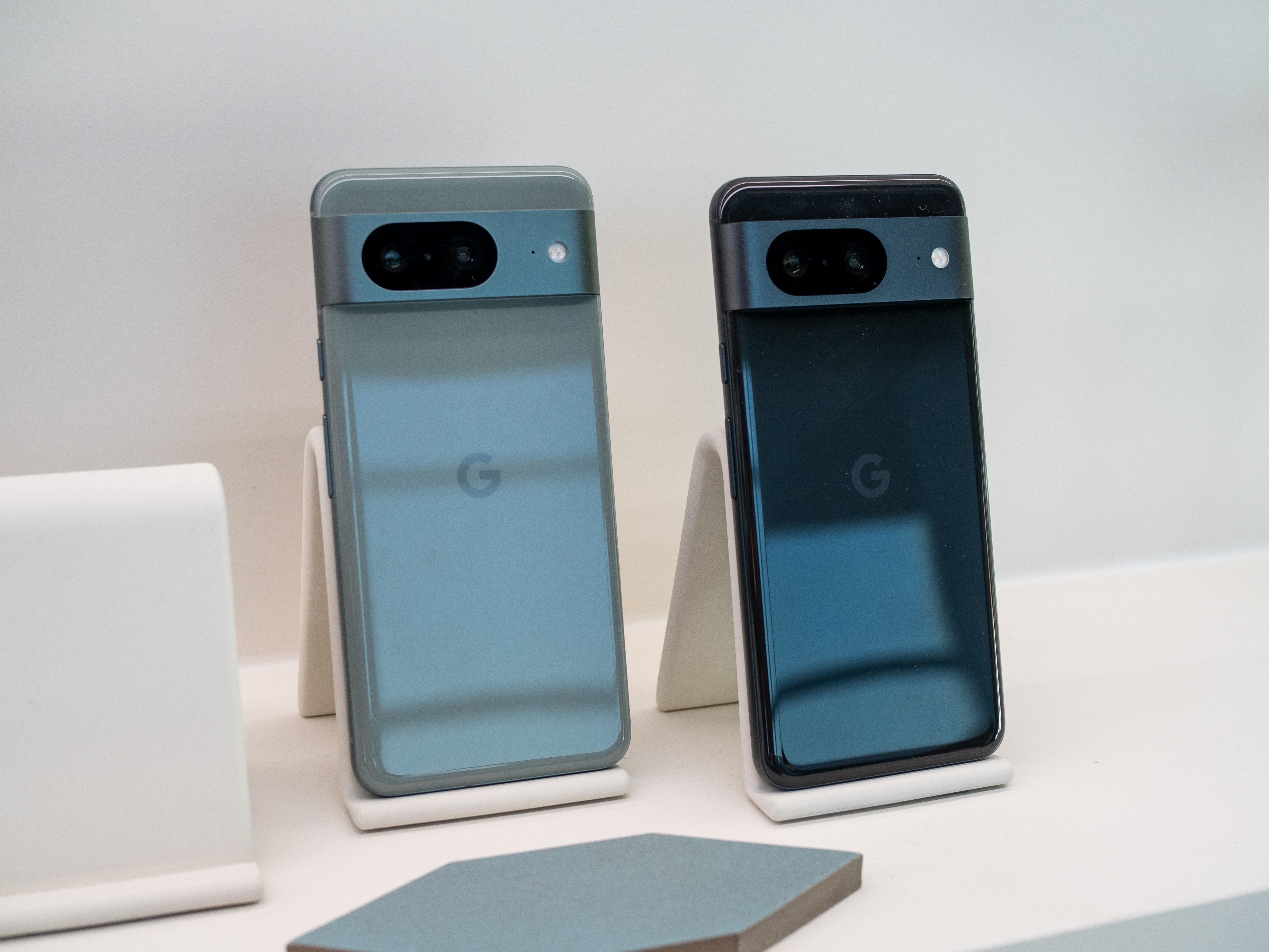
What about durability? Both are likely to be similarly tough, though the Pixel 8 Pro uses Gorilla Glass Victus 2 rather than the first edition of Victus the Pixel 8 uses. Will that make a massive difference? Probably not. Both have an IP68 rating for dust and water resistance, so they can resist water ingress from short dips in clear water. Don’t take them swimming, though.
While these two phones share a lot of similarities, the Pixel 8 Pro’s better display helps it take this category. Even if you might not notice the lower refresh rate, it should help with battery life.
Winner: Google Pixel 8 Pro
Google Pixel 8 Pro vs. Pixel 8: performance, battery life, and charging

These two phones feature the public debut of Google’s new processor, the Tensor G3. Representing the third generation of Google chips, the Tensor G3 offers upgrades across the board — including to the CPU and GPU — and may hopefully fix some of those temperature issues we’ve previously seen with the Tensor range. Both phones use this chip, so it’s largely a tie here.
Not so when it comes to storage, though. The Pixel 8 starts at 128GB, with the option to upgrade to 256GB. The Pixel 8 Pro has these options and then some extra, with 512GB and 1TB variants also available. We’re not sure why Google couldn’t have pushed the Pixel 8 to a 512GB option too, as it’s somewhat left out in the cold. However, even 256GB is going to be plenty of space for most buyers, so it’s not that big of an issue.

Battery life is harder to judge since we’ve not had the chance to take either phone for a spin yet. The Pro has a larger battery, but it also has a larger display to power, so it’s hard to say whether that will make a big difference in the end. The Pixel 7 and Pixel 7 Pro had a similar difference in battery capacities, and the Pixel 7 actually came out as the slightly more long-lasting device during our reviews, but all that may change now that there’s a new processor in the mix. For what it’s worth, Google advertises the same 24 hours of regular use and 72 hours with Extreme Battery Saver engaged that it did for the Pixel 7 series last year.
Charging is a slight advantage for the Pro model, but it’s so slight we’re not sure why Google bothered to include it. What’s the difference between the Pixel 8 Pro’s 30-watt charging and the Pixel 8’s 27W? Not that much, so why bother making the difference in the first place? Given the Pixel 8’s slightly smaller battery cell, we expect they’ll end up full at about the same rate anyway.
Until we’ve had the chance to test the batteries, this is a tie.
Winner: Tie
Google Pixel 8 Pro vs. Pixel 8: cameras
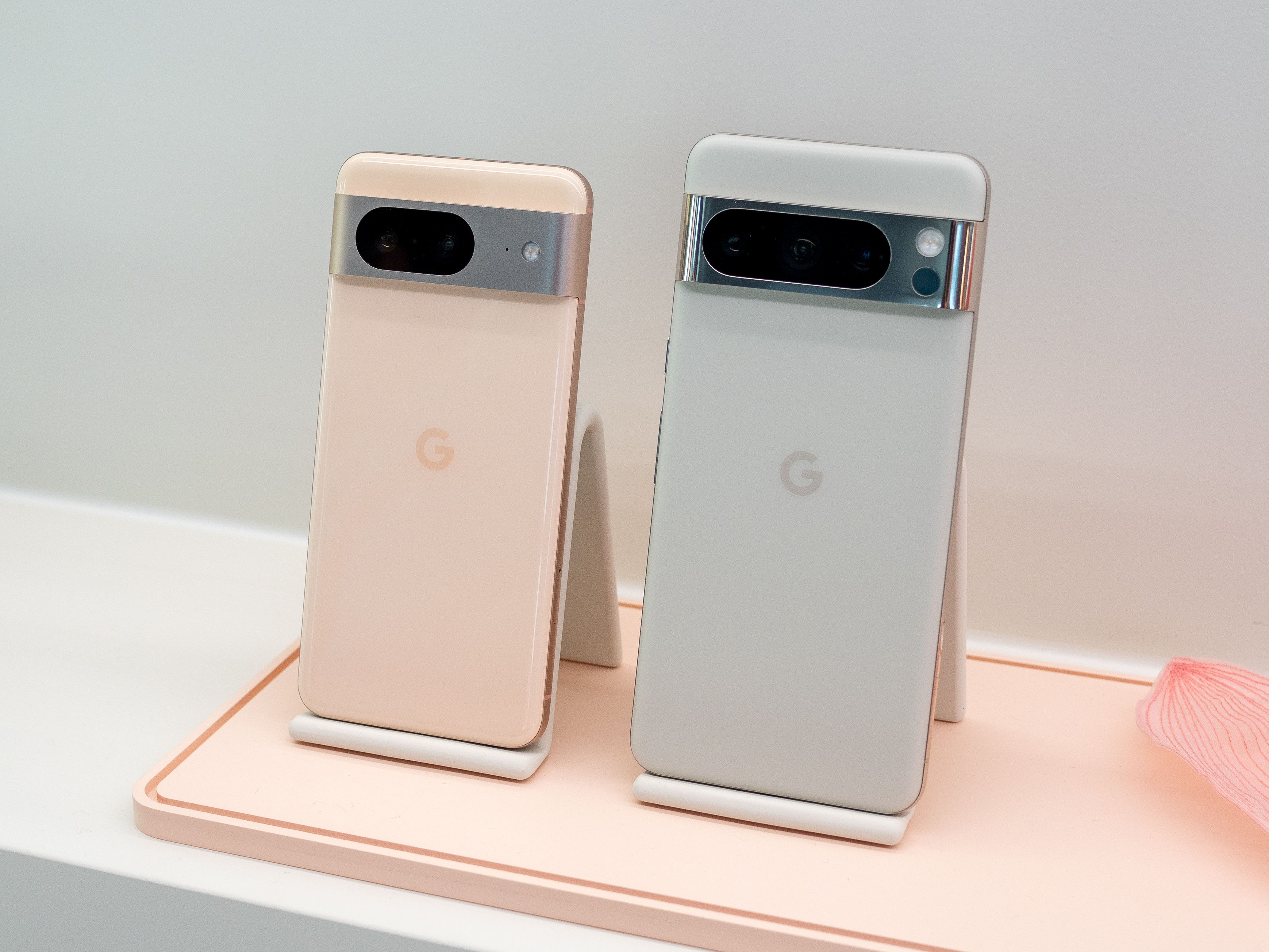
The cameras are another area the Pixel 8 Pro has an immediate edge in, as it comes with a lens the Pixel 8 simply doesn’t get: a 48-megapixel telephoto camera with a periscope zoom of 5x. It’s clear the Pixel 8 Pro has a big advantage, but the Pixel 8 still has a lot going for it. It has the same 50MP main lens, with a digitally corrected 8x digital zoom and an 82-degree field of view. It’s joined by a 12MP ultrawide lens, the same lens we saw in the Pixel 7 and Pixel 7 Pro, and we expect it to be just as impressive a shooter as before. Unfortunately, it’s up against an upgraded system in the Pixel 8 Pro. Not only does it have the aforementioned telephoto lens, but it also has a 48MP ultrawide lens. We haven’t had the chance to test this yet, but Google rarely makes missteps with its camera tech, so we’re quite confident it’s going to be a winner.
Don’t get us wrong, the Google Pixel 8 is very likely to have a very good camera system indeed, but at this moment, we can’t see it matching the tech on display in the Pixel 8 Pro.
Winner: Google Pixel 8 Pro
Google Pixel 8 Pro vs. Pixel 8: software and updates
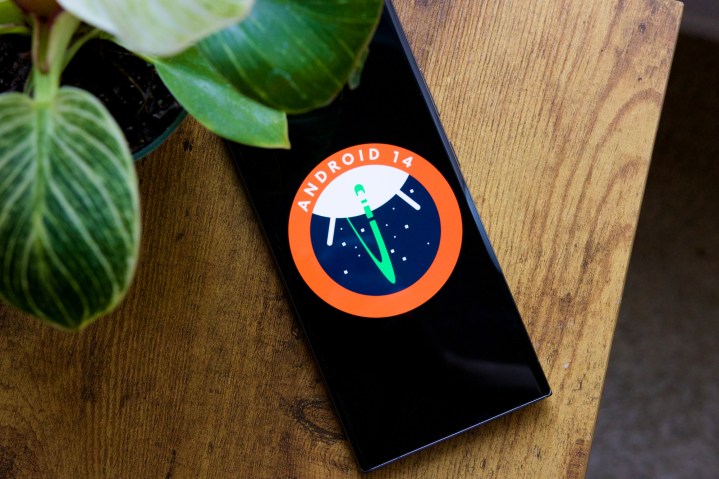
Finally, the Google Pixel 8 Pro finds itself in a category where it doesn’t have an upper hand. Both of these phones come with Android 14, and it’s one of the purest Android experiences you can have, especially on a flagship smartphone. There are some additions just for the Pixel, but outside of that, it’s Android at close to its most pure. As such, it’s swift to respond, doesn’t have any bloatware (outside of carrier additions), and is generally a joy to use.
There are further gems to be found here, too, in the form of a groundbreaking commitment to updates. Google has promised to keep the Pixel 8 range updated for an incredible seven years of operating system updates. Yes, buy this at launch, and you won’t run out of major Android upgrades until 2030. It’s an incredible promise, and both Pixel 8 models get this.
There’s little to separate these two here. It’s a tie.
Winner: Tie
Google Pixel 8 Pro vs. Pixel 8: special features
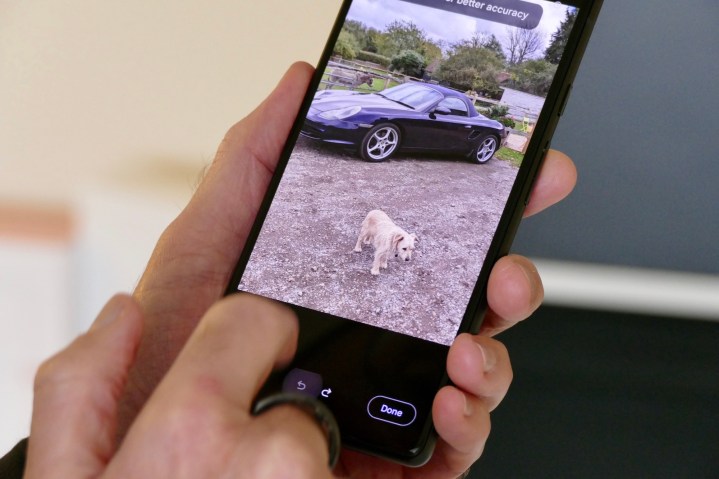
Google has gone big on special features this year, and they’re all based around AI and machine learning. Magic Eraser, the big release last year, has been significantly upgraded and can change the lighting of your final image. That’s combined with the new Best Take feature, which can blend elements from a series of photographs to create one final image. So if one person’s face looks better in a different shot, your Pixel can move it over to your chosen image and slot it in. Think AI-powered Photoshop, and you’re really not wrong. The Pixel 8 Pro has only one main advantage over the Pixel 8, and that’s a new Pro (aka manual) mode in the camera app to fine-tune things like your aperture, white balance, and other professional settings.
A number of existing features have also been improved. The spam filter works better than ever, Gboard now has spellcheck and proofreading abilities, and the Google Assistant can translate websites and then read them aloud while sounding more natural than before.
There’s a lot here, but importantly, almost all of it is shared across both phones. This is a tie.
Winner: Tie
Google Pixel 8 Pro vs. Pixel 8: price and availability

The Google Pixel 8 and Pixel 8 Pro are both available for preorder now, and both phones will be released on October 12.
The Pixel 8 starts from $699, $100 more than the Pixel 7. The Pixel 8 Pro follows the same trend, increasing the MSRP of the Pro model by $100 to $999.
Overall winner: Google Pixel 8 Pro
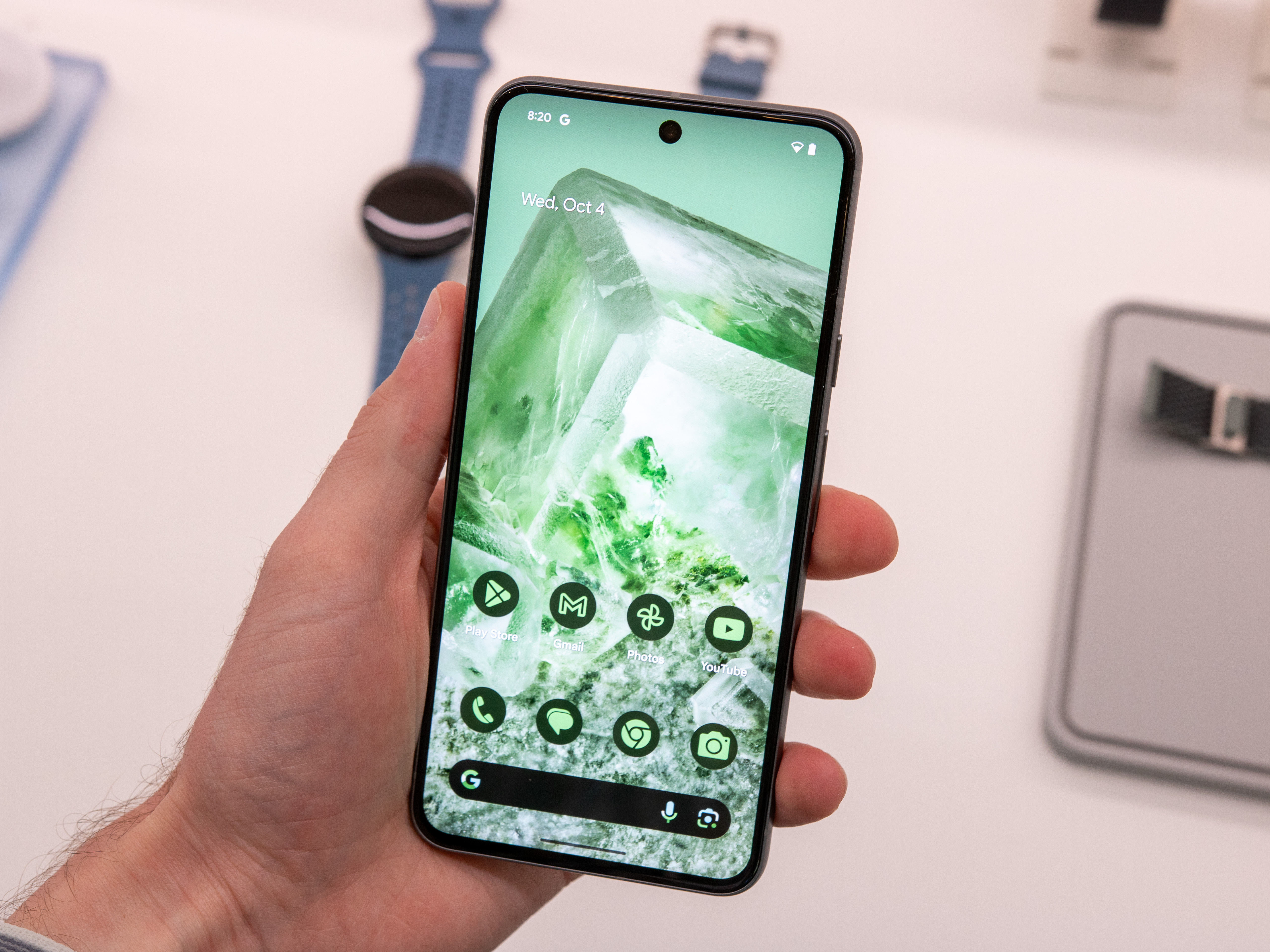
It was always going to be difficult for the standard Google Pixel 8 to beat its larger, more advanced sibling, and it’s not a poor reflection on the cheaper smartphone to have lost this bout. The Google Pixel 8 Pro is definitely the winner here, thanks to a stronger display, extra camera features, and extra storage options. If you take price out of the equation, then it’s clear why the Google Pixel 8 Pro wins.
But we don’t tend to ignore price, and the price differences here are very important. There’s a hefty $300 difference between these two devices, and that’s a very important factor to consider. We know the $300 gets you a better display and camera, but you’ll need to pay quite a lot more to get access to the higher storage tiers. That leaves us with the display and camera. The stronger display gives you a brighter, more detailed screen and the ability to dip to lower refresh rates. The camera gets you the periscope zoom and an ultrawide lens with more megapixels. Are all those worth $300?
That’s a personal question for sure, but the Pixel 8 still offers a lot of what makes the Pro model so good. It has the powerful Google Tensor G3 processor, a 120Hz refresh rate, and some of the best smartphone cameras around — which means the Pixel 8 isn’t a lesser option in a lot of ways. If you’re happy to live without the extras the Pro offers and love saving a bit of money, then the Pixel 8 is an absolute bargain. Is money no object? Then it’s the Pixel 8 Pro every day.
Editors’ Recommendations